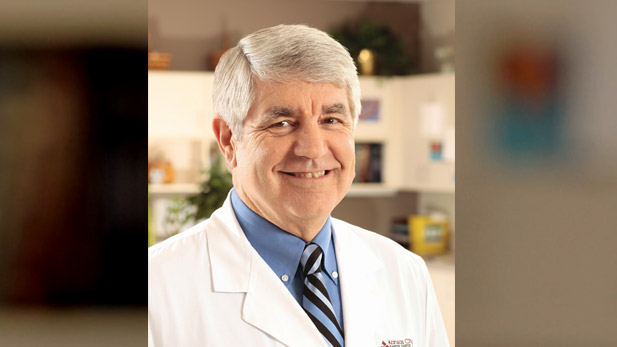Gene Whisper: Alumnus Larry Geier’s Cancer Genetic Efforts Saving Lives

Biological engineering alumnus Larry Geier’s groundbreaking work in cancer genetics has become a model for cancer prevention programs across the world, identifying nearly 500 patients with cancer-causing traits.
Oncologist Larry J. Geier, MD, may be known as “The Gene Whisperer,” but his game-changing work in cancer genetics speaks loudly in the world of cancer prevention.
A 1972 graduate in biological engineering, Geier’s program of genetic risk evaluation and cancer risk management has become a model for cancer prevention programs across the world. He has performed more than 4,000 genetic consultations and identified nearly 500 patients with cancer-causing genetic traits.
This is important work, given inherited genetic traits are responsible for 25% of ovarian cancers, 10-15% of breast cancers and 5-10% of colon cancers. That means many thousands of cancer cases that occur each year are potentially preventable, if it was only known which people carried the genetic traits.
That’s why Geier’s work is so vital.
“If we can identify the people who carry the bad traits and we can apply modern strategies to lower their cancer risk, maybe we can help millions of people to never have to meet an oncologist, to never have to hear the words, ‘I’m sorry, but you have cancer,’” he says. “Once I knew this was possible, it became my life’s mission to make every doctor, nurse and patient who would listen aware of it.”
After chairing a major symposium on cancer genetics at the 2009 American Society of Clinical Oncology annual meeting, Geier made presentations on the topic at cancer centers across America, Europe and South America. While practicing medicine in the Kansas City area his professional focus shifted into the emerging field of cancer genetics in 2005, and he developed the GREAT program, a comprehensive way of evaluating patients for the possibility that they could be carriers of a cancer-causing genetic trait. This model has become the blueprint for many similar cancer prevention programs throughout the world.
For Geier the mission is personal.
“There were many times over my career when I sat with a 35-year-old woman with breast cancer or a 40-year-old man with colon cancer and thought ‘Why did this have to happen?’,” he says. “Often it was in the context of a strong family history of cancer, and I wondered, ‘How did we not see this coming? Could we have done anything to prevent it?’ I became ever more interested in the prevention side of cancer, but for years it seemed like an exercise in futility. When we started to figure out the genetic side of things, that some people were literally programmed to get certain cancers, it opened my eyes to a whole new approach.”
While Geier’s field is not directly aligned with his engineering background, the GREAT program resulted from the critical-thinking and problem-solving techniques that he learned at Rose-Hulman. And because the concept was so revolutionary, he and others conducted a pilot study as a proof of concept – more engineering – to convince skeptical medical colleagues and patients that he was on the right track. The results of that study were astounding, even to him. “There were so many patients carrying these genetic traits right under our noses and we had no idea. We were missing the chance to prevent future cancers in our own patients, as well as their family members.”
Now Geier states that “more physicians are taking up the cause all the time, but there are still many more who need to do so. Many doctors and the general population underestimate the prevalence of these genetic traits, the cancer risks that are associated with them, and the effectiveness of modern risk-reducing strategies. Some can’t look past the patient in front of them, and they fail to consider the risks facing other family members. And then there are the doctors who think that this is not their job, it is some other doctor’s job to figure this out. It has been my mission to undo these various misconceptions, and to convince doctors of all disciplines that they each have a role to play in the solution.”
-----------
Larry Geier, one of the Alumni Association’s 2021 Honor Alumni Award recipients, discussed how you can assess your cancer risk in his Rose Talk, “How Do I Look in These Genes?” Watch it here.